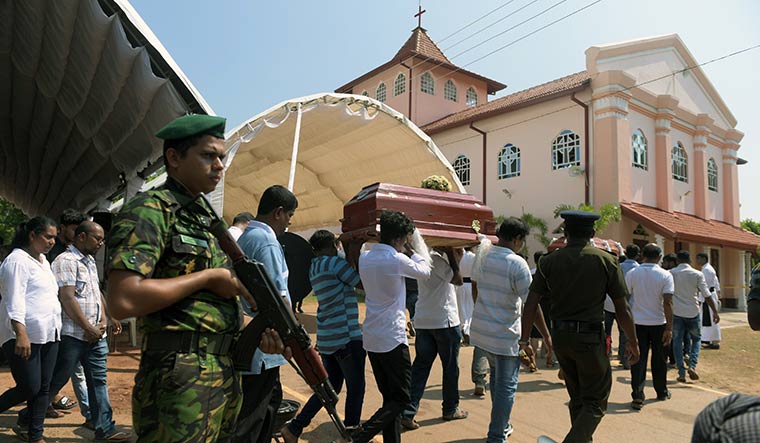Following the Easter Sunday bombings in Sri Lanka on April 21, which killed more than 250 people, some Buddhist monks have demanded that the country be made a theocracy.
On July 7, the controversial Gnanasara Thero, secretary general of the nationalistic Bodu Bala Sena (BBS), told a massive Buddhist conference in Kandy that if 7,000 of 10,000 Buddhist temples on the island contested elections, the face of Sri Lankan politics could be changed. Gnanasara was till recently in jail in a contempt of court case; President Maithripala Sirisena cut short the six-year term, on May 23, through a special pardon.
Gnanasara said the Buddhist clergy was capable of mobilising the Sinhala population into a single vote bloc, to elect a party that would get a clear majority in parliament. The call was to shape a pristine Buddhist identity and vanquish Islamic terrorism.
Though the traditional Sufi Muslims of Sri Lanka have a history of living in peace, the growth of puritanical Wahhabism and Salafism has distanced Muslims as a whole from the rest of the populace.
Interestingly, the Easter bombings were aimed at the minority Christians and not the majority Sinhala Buddhist community. The Christians have largely been silent bystanders in the strife between Buddhists and Muslims. But a few weeks after the bombings, Cardinal Malcolm Ranjith, head of the Catholic church, declared that Sri Lanka was a Sinhala Buddhist country. For BBS and similar groups, this statement was a great morale booster.
The BBS hit the headlines after the anti-Muslim riots in Aluthgama in 2014, in which four people were killed. Riots rocked Ampara and Kandy last year and several areas around Negombo in May this year.
At the conference in Kandy, Gnanasara lambasted democracy and pledged to build a ‘Sinhala parliament’. He declared a wish to mould Muslim culture as the Sinhala monks wished.
The BBS and similar groups have of late been making a distinction between the traditional Sufi Muslims and the Wahhabis. Gnanasara said he was advocating the cleansing of extremist ideologies that had tarnished the name of the Sufi Islam.
The BBS had five years ago warned about Islamic State-style attacks being planned in Sri Lanka. At the time, however, these seemed more of a ploy to instigate violence against Muslims.
The Sufi Muslims, on their part, have started speaking out, emphasising that Wahhabism is not Islam. Several Sufi imams were killed in Kattankudy, the all-Muslim enclave in the Batticaloa district. Soon after the Easter bombings, Aboosali Uvais, a member of the Federation of Mosques in Kattankudy, gave a detailed account of National Thowheed Jama’ath leader Zahran Hashim to a parliamentary select committee. He said Zahran had set up mosques and openly preached that everyone except Muslims in Sri Lanka should be killed.
In March 2017, Zahran had held a meeting close to a Sufi place of worship, which ended up with the Sufis being attacked with knives and swords. He then went into hiding. The next time he appeared in public he blew himself up on Easter Sunday.
M. Sahalan, a Kattankudy Sufi imam, broke down while giving evidence to the select committee. He recalled how the Wahhabi majority in his area had labelled him a “convert” from Islam “to another religion” and how Sufi families were continually harassed and shamed as “outcasts”.
The committee was told that Muslim politicians had bowed to Zahran’s decrees and stopped using music in election campaigns and were following strict gender segregation in political rallies. As a result, the Sinhala-Buddhist agitators began seeing Muslim politicians as Wahhabist pawns spreading extremism.
Recently, Athuraliye Rathana Thero, a hardliner monk and MP, went on a fast demanding the sacking of three Muslim politicians—two provincial governors and one minister—who were allegedly linked to the suicide bombers. They did resign, but so did all eight other Muslim ministers, apparently in an act of solidarity.
The Buddhist monks have called for the abolition of the All Ceylon Jamiyyathul Ulama (ACJU), which is the top body for Sri Lankan Muslims. The BBS maintains that the ACJU is lobbying for Wahhabism. Gnanasara said the government was talking only to the ACJU and ignoring the traditional Sufi Muslims. “They need to stop doing this immediately and start talking with the Sufis,” he said in Kandy. “Let the Sufis be put in charge of Islamic affairs.”
A leading Sufi scholar, Moulavee Alhaj Abdul Jawath Aalim Adbul Rauf, is the founder of the All Ceylon Sufi Jamiyyathul Ulema. “But the ACJU has described his speeches as ‘Hindu doctrine’ and issued a fatwa excommunicating him and about 10,000 Sufi followers,” said H.M. Ameer, a Sufi leader from Batticaloa. “They are still fighting this fatwa.”
“We are taking every step as responsible traditional Sufi Muslims of Sri Lanka to fight Wahhabism,” Ameer said. “On Ramadan, 1,700 pages against Wahhabism, written by Moulavee Rauf, were published. We have also discussed with military heads to eradicate the remaining Wahhabi institutions that are functioning as charities under different names. The government has already banned three institutions blamed for the Easter attacks—the National Thowheed Jama’ath, Militia Abrahamia and Wilayat Seylan. But this is not enough because so many institutions are functioning island-wide. They get funding from different charities in the Gulf to promote Wahhabi extremist ideologies. That is why we have asked the Lankan military to look into these organisations carefully.”


